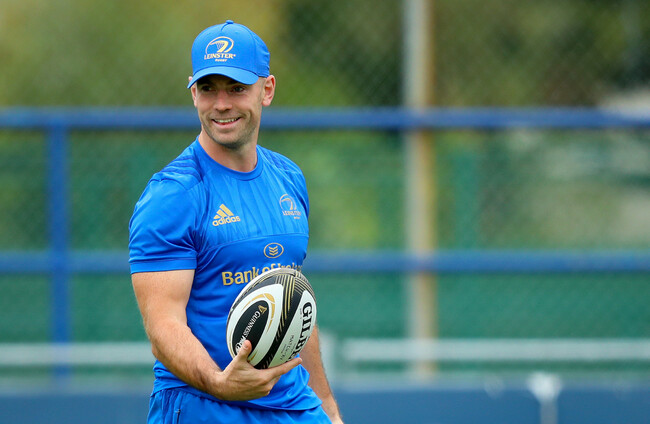THE CHALLENGE FOR Scarlets defence coach Hugh Hogan this week was figuring out which bits of Leinster’s approach that his players needed to know about most.
Having left Leo Cullen and Stuart Lancaster’s set-up just a few months ago to join the Welsh region, Hogan has a unique insight into what makes Leinster tick but there’s only so much time in the training week and overloading players is never a good idea.
Hogan could have put together a four-hour presentation on Lancaster’s attack and decision-making structure or run through 30 starter plays that Cullen and Felipe Contepomi love employing, but brevity was key.
“Part of the art of coaching is boiling things down to what matters most,” says Hogan.
“We’ve got to go with what matters most, otherwise you’re messing with the players’ brains.”
Saturday’s visit to the RDS will see the Scarlets looking to bounce back from a humbling 43-13 home defeat to Munster last time out in the United Rugby Championship, with their defence giving up seven linebreaks and making some key errors close to the ruck.
Having beaten the Lions a week before, Scarlets were off the pace against Munster’s rotated team so Hogan is hoping his players deliver something far more convincing in Dublin as he plots against some very familiar faces.
“Much like when you’re playing against your brother in any game at all, it’s fierce competition and you don’t want to lose,” he says of facing friends and former colleagues.
Having coached in Leinster’s academy system for several years, Hogan was promoted to the senior set-up as contact skills coach in 2017 and earned consistently glowing reviews from the province’s players for his work on making their technique more effective and safer.
Hogan had re-signed with Leinster to continue into the current season and was over in Sweden – his partner Selma’s homeland – during the summer when he got a text from new Scarlets boss Dwayne Peel out of the blue.
A video call later, he’d been offered the defence coach role with the Welsh region, which instantly appealed. Hogan had previously discussed coaching progression with Cullen and praises the Leinster head coach for his understanding.
“Leo genuinely is people-first. He told me that if I felt it was interesting for me or good for my family, to go for it. He said not to worry about things in Leinster, he would deal with it.”
Guy Easterby was equally good in facilitating the move and Leinster have since promoted Denis Leamy into Hogan’s old role. At Scarlets, Peel has handed Hogan full responsibility for building and running the defensive system, although the Irishman isn’t getting too far away from his background in technical detail.
“For me, a big part of success within the system is the players’ actions,” says Hogan. “I still coach the tackle and the defensive breakdown.
“Having seen the evolution of some players at Leinster over the last few years, young lads coming through and playing for Ireland, it’s both strands that are important. The defence itself is important but equally, you’ve got to equip the players within the defence.”
Hogan was an excellent player in his time, starring for the High School, Trinity, Ireland Clubs, and St Mary’s, who he captained to their All-Ireland League title in 2012.
He caught the coaching bug early, returning to the High School the season after he finished school to work with their U14s. Within four years, he was coaching their Senior Cup team.
His progress continued with St Mary’s College and the club, where he became head coach of their senior side only months after captaining them to that AIL glory.
In 2013, Leinster hired him as a full-time elite player development officer [EPDO], a role that involved working with their most promising young prospects while also coaching Leinster and Ireland age-grade teams.
“The reality is there are very few professional jobs so I was very fortunate to get the opportunities I got that have led into professional coaching,” says Hogan. “But if it hadn’t happened, I would probably be coaching in the AIL at the moment.”
Leinster was the perfect environment for someone with Hogan’s voracious appetite for learning, with the province facilitating his visits to clubs like Clermont, the Stormers, and the Brumbies when Stephen Larkham was head coach there.
Each club had unique components Hogan learned from, while he has continued to seek out ways to challenge his thinking. During lockdown last year, for example, he tapped up Girvan Dempsey for ex-Bath flanker Francois Louw’s contact details, keen as he was to discuss the breakdown with the Springbok World Cup winner.
“Louw one of the best decision-makers at the breakdown and different to someone like David Pocock, who went for lots of turnovers and got lots of them too. Louw was very smart around that decision-making.”
They spent a couple of hours on Zoom chatting about the nuances of the breakdown, with Hogan then sharing what he had learned with Leinster’s ‘poach group.’ Josh van der Flier did something similar with Wallaby great George Smith.
“When you assume you know it all or that you’ve got the best plan, you’re probably in a stagnant period,” says Hogan.
While he was happy in Leinster, the opportunity to take on more responsibility as defence coach with Scarlets was impossible to refuse. Now settled in the scenic Mumbles area with Selma and their son, who turns two very soon, Hogan is motivated to play his part in Peel’s plan to make Scarlets trophy contenders again.
Their porous defence was a big issue last season and last weekend’s defeat to Munster showed there are still big steps to take, but Hogan is excited by Peel’s encouragement to be creative even with the defensive side of the game.
“Peely is very conscious of that – not copying a team because they’re successful, actually trying to innovate and where the game is going. You can’t just say ‘Leinster are the best, let’s copy Leinster.’
“Last Sunday aside, it has been a great experience here.”
Hogan always felt that going abroad would be part of his coaching journey, allowing him to get out and stand on his own two feet, but he says he’s not one for making grand plans.
He’s not saying he aims to come back to Ireland to coach in the future simply because he doesn’t want to miss any opportunities that might land in front of him.
“I listened to a speech by Steve Jobs recently and the point he made was that it’s only afterwards that you get the chance to look back and join the dots of how you’ve arrived where you are,” says Hogan.
“At the time, some of those dots might not make sense to you or be exactly what you want, but they will lead you on the journey and when you look back it will all make sense.”













He’s not as disappointed as some on relation to how far off they are? They are miles off. No offence to Munster but they are an average,though very gutsy and committed side,and they have hammers Leinster twice in a row now. I do agree that they haven’t had any continuity with combinations,especially from 9-13,and hopefully when the likes of OBrien, Healy, Moore, Teo, McFadden etc come back then there will be a big improvement.
I must take the opportunity to praise Matt O’Connor for the huge improvement in Guinness Pro12 teams. Ever since he arrived at Leinster, every other team has greatly improved. Teams, that two years ago were almost brushed aside by Leinster, have now reached the heights that Leinster once inhabited alone.
Treviso have improved, Munster have improved, Edinburgh have improved, Scarlets have improved, Dragons have improved, Zebra have improved, Connacht (brilliant tonight, by the way) have improved..
In fact, they have all improved so much that Leinster has great difficulty taking on any of them.
By extension, Wasps and Harlequins have shown just how brilliant they are too due to you Matt.
I can hardly wait to see how much Castres get better when they arrive at the RDS soon. They will build statues in your image all over the town.
Matt, you have done European rugby a great service. They have all reached and surpassed Leinster this season thanks to your input at Leinster and everywhere else.
Thank you Matt and Happy New year!.
(and also to Mr Caputo, the news paper seller. Your influence on all other teams has been exceptional)